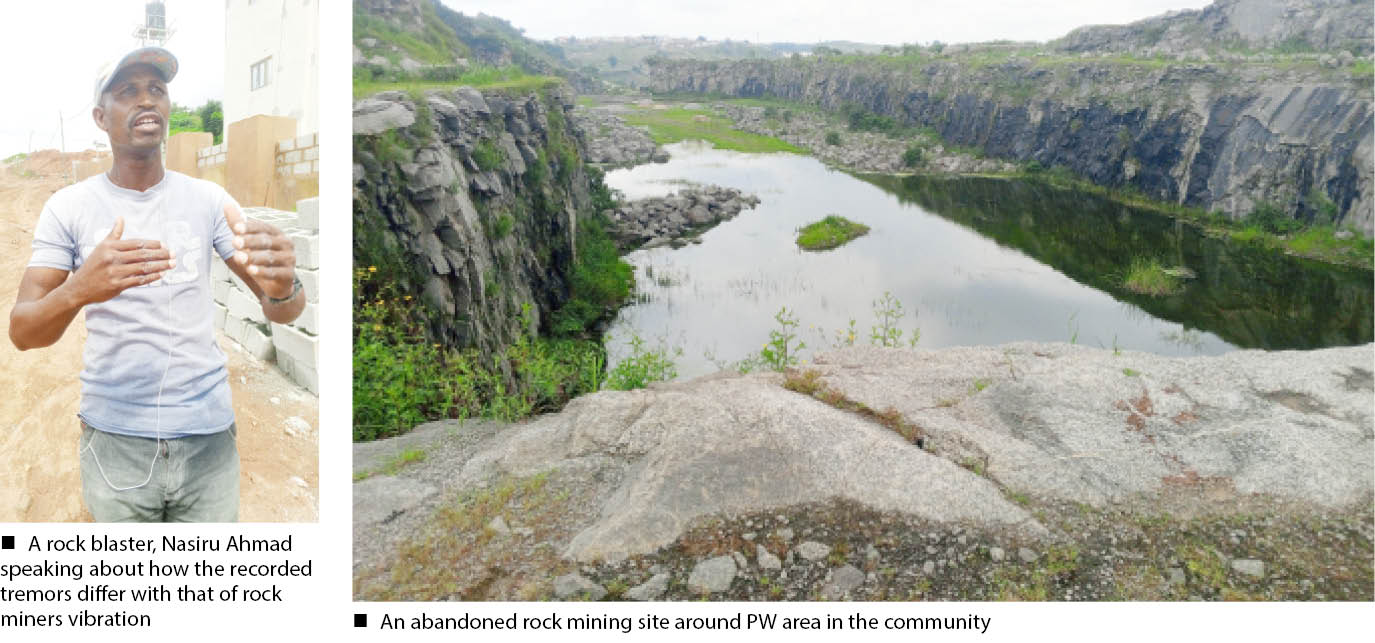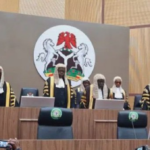Residents of Mpape community, an Abuja suburb in Bwari Area Council in the FCT, were thrown into panic, following a four days mini earth tremor that shook the community. Mpape is situated less than 10 minutes’ drive from the Abuja highbrow district of Maitama. It is densely populated with many low-income earners as well as the middle class among its residents.
Residents who spoke to the Daily Trust said the earth tremor was accompanied with a devastating sound that started on Saturday and did no subside until Tuesday. The situation was first noticed around areas like the P.W neighbourhood, and Mopol 24 Barracks, two areas sandwiched by the lonely single road that leads into the community.
It was also heard around Katampe junction, which is linked to the Murtala Muhammad Expressway. Further investigation revealed that the tremor also extended to the central part of the town, as well as adjacent villages.
Musa Yushi, a resident, said the tremor affected Jikoko, Durumi and Galawi communities, located along the Mpape-Ushapa road. He said it subsided on Tuesday with about five noted incidences around the Berger Area. Three incidents were noted on Wednesday.
- Muslims in Osun stage protest to demand freedom for Palestinians
- On Palestine, Israel’s attacks in Lebanon and the need for Muslim unity
Another resident, Obinna Ngozi, said the buildings shook when the movement took place, causing fear in the residents. He said he noticed the movement about 10 times on Saturday from around 4pm, adding that the situation got worse the following day, Sunday.
Muhammad Ibrahim also said he first mistook the incident to be a bomb blast, as it sounded quite different from that of quarry mining, which the area has made a name.
A mine blaster, Nasiru Ahmad, who spent years in the profession in the community, said one could hardly understand where the sound was coming from, unlike that of stone blasting, which is easily identified.
He, described a similar incident that took place about three years ago in the area as a more devastating one, that was noticed as far away as Gishiri, Jahi, Maitama, as well as AYA, in Asokoro District.
A resident, Umar Muhammad, said the movement forced many to wake up from their sleep as all surroundings began to shake. He said the situation caused worry among the residents and others are contemplating to relocate to other areas.
Alhaji Abbas Bello has spent about two decades in the community and attributed the incidents to the mining activities that took place there some years ago.
“You know Mpape used to be the centre of crush mining in the FCT. A number of construction companies used to maintain a crushing site here. But the relocation of people into the area due to demolition exercises by the government forced the companies to look for other sites. So, there is a belief that some of those tremors that took place occasionally, have to do with the past activities,’’ Bello said.
A chief in the community, Peter David, said the last incident happened at Arab Road about three years ago. “Following that incident, officials of the National Emergency Management Agency had stopped all mining activities in the community.
However, the compliance only lasted for about three months, before the operators returned, the chief added.
Expert explains
Prof. Sani Abubakar Mashi, a professor of Geography at the University of Abuja, and currently the national president of the Association of Nigerian Geographers, said earth tremors happen due to internal movement of the earth.
He, however, said the one experienced in Mpape was largely due to human activities. He said the rock blasting in the area is a call for alarm.
“To blast a rock, they made used of explosives; they dig deep into the rock and put the explosives linked with wire, and later detonate them remotely.”
He said through this wave is propagated deep inside the lower layer of the rock, which creates waves accompanied with sound that shake the ground layers of the earth.
He said in the process of producing the rock fragment, they release energy which creates vibration from inside. The expert noted that such activity causes the soil to shake as well as everything on its top, which is responsible for earth tremor occurrence around the Mpape area.
He said it often leads to ground movement and the shaking of buildings, noise is also a serious environmental concern associated with that.
“The development can also lead to the release of chemicals into water sources like boreholes which get contaminated.’’
Mashi also said indiscriminate drilling of borehole can contribute to tremors occurring, especially when explosive is used at the lower layers – around 50 to 100 meters down.
He suggested the automisation of the blasting as one of the ways to guard against earth tremor.
“Let there be automisation guiding it. But what is happening is that the operators are going to any lower layers of the earth where they are so sure that they would get the rock.
“The second thing is to carry out monitoring and research activities, so that whenever there is intensity of such operation taking place, the received signal will give alert. They equally need to be enlightened and warned regularly about the dangers and consequences.’’
The professor of Geography also suggested that people should not be allowed to reside in such areas.
He, however, aid such tremor generally, could not lead to earthquake in Nigeria as we do not fall within such terrain.
“Earthquake occurs as a result of the movement of the continental plate. When two plates are moving towards each other and expanding from each other, that is the movement of the earth. And that is why you have an earthquake. Fortunately for us we are not living around the environment where two continental plates are meeting,’’ Prof. Mashi explained.
FCTA sets up emergency committee
The Federal Capital Territory Emergency Management Department has constituted an ad hoc committee on emergency preparedness and planning for earth tremors in some parts of the FCT.
The Ag. Director-General of the FCT Emergency Management Department (FEMD), Engr. Abdulrahman Mohammed, said this after a meeting with stakeholders on the recent vibrations in some parts of Mpape.
Mohammed said the ad hoc committee is expected to sensitise residents on what to do during and after a tremor.
According to him, the earth tremor which first occurred on Saturday at Mpape exhibited no physical evidence of rock movement.
Also, a water consultant, Engr Taiwo Oyekan, said human activities may have caused friction on the edges leading to the tremors.
Oyekan, who stated that there must be a blast threshold by quarry companies, suggested that all rock blasting in the area must be put on hold for now.
Geological agency tells FCT residents to remain calm
Meanwhile, the Nigerian Geological Survey Agency (NGSA) has urged residents of the Federal Capital Territory (FCT) to remain calm following reports of earth tremors in some parts of the territory.
NGSA Director General, Prof. Olusegun Ige, made the call in a statement on Wednesday in Abuja.
Ige urged the residents of the affected areas and other parts where the tremors were felt not to panic, as they were generally minor and did not pose any threat to the environment.
He said the agency was closely monitoring the situation across Nigeria and would provide updates as required.
The NGSA boss stated that a team from the agency had visited the affected areas for an on-the-spot assessment of the various incidents.
Ige added that the agency drew its conclusions from the accounts of residents in the affected areas, observations by its team and findings from earlier interpretations of airborne geophysical data over the area and adjoining regions.
“The tremors are a result of accumulated stress along the identified faults and released seismic energy, which may have travelled through associated fractures to areas where the tremors were felt around the FCT.
“The intensities of the tremors are weak, ranging from three to four on the Modified Mercalli Scale, and pose a very low-level threat,” he said.
The director general further said the monitoring station (NGSA-5) at Katampe has been capturing several significant ground motions with high moment magnitudes from September 13, 2024.
According to him, only one mild incident was recorded on September 13; six were captured on September 14, while more than 21 incidences were captured on September 15 with higher intensities.
“More than 20 events were recorded on September 16. The intensity and frequency of the tremor appear to increase from the 13 to 16 September. There are a few weak events recorded on September 17,” he said.
The systems enable a quick assessment of potential damage to structures and ensure necessary actions to mitigate losses, including the protection of lives. (NAN)

 Join Daily Trust WhatsApp Community For Quick Access To News and Happenings Around You.
Join Daily Trust WhatsApp Community For Quick Access To News and Happenings Around You.


